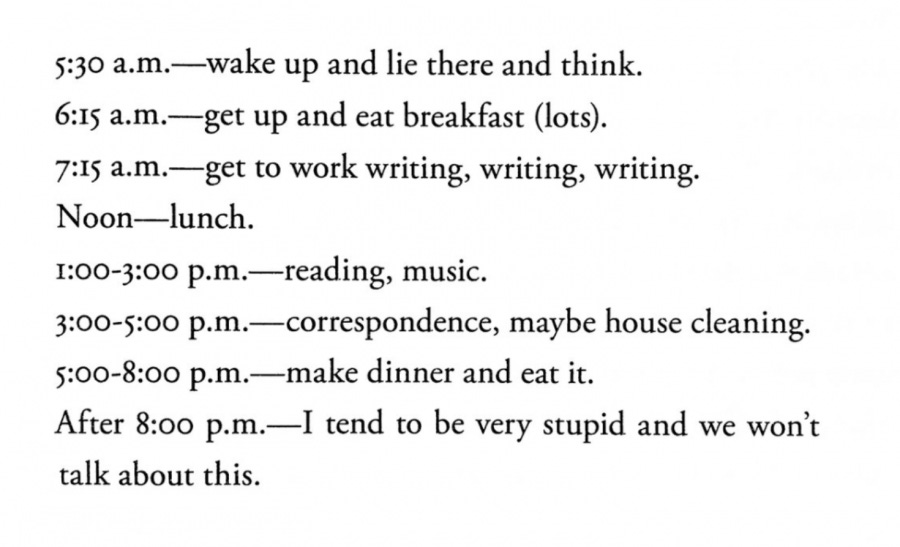Your creative routine should be customized
General advice for specific people, and some ideas for your writing schedule.
You’re reading Soft Hobbies, a weekly newsletter for creatives in all mediums, with a special focus on writers. I’m Auzin, a Seattle-based writer in the fiction, poetry, and tech spheres. To see more of my work, visit my author website or check out my socials.
You can support Soft Hobbies by using the heart button on this post, subscribing to the newsletter, or forwarding this email to a friend.
Note: THANK YOU so much for helping me grow to over 200 subscribers! Your support of Soft Hobbies keeps me writing every week. I’m thrilled to reach this milestone.
Hi softies,
At this point, most of us know that we need a creative routine. The fantasy of one day having enough time to stare out the window for hours, sipping tea and waiting for The Muse to bonk you on the head is just that — a fantasy. Inspiration comes when you open the door and invite it inside on a regular basis. Let’s make our heads as available for bonking as possible.
Even if you’re not a full-time or professional creative/writer/artist, a routine is essential. A routine helps you grow your craft, unwind with your hobbies, explore your creativity, and/or spend some quality, character-building time with yourself. (It’s your longest relationship, so you might as well nourish it.) It’s okay if you don’t view yourself as “a writer” or “an artist,” etc., you still deserve to fit creativity into your schedule.
Since I’m a writer, I’ll be talking about writing in this post, but I think there are also takeaways for those who work in other mediums.
Your role models don’t know what’s best for you
See the pic below? It was Ursula K. LeGuin’s daily schedule at one point. As a huge fan of LeGuin’s work, I’ve idolized this schedule in the past. It sounds so perfect, and is written down so succinctly and delightfully:
I wish I could follow this to the letter. I’ve tried! But I’ve never been a fan of large breakfasts; they make me want to go right back to sleep. And I’m an early riser, but lying in bed (without my phone!!!) for 40 minutes, beginning at 5:30am, is not my idea of a good start to the day. I love starting the day with my at-home workout, and as you can see, there’s barely room in this schedule for movement at all.
I think the section that resonates with me the most, other than how my brain also turns off after dinnertime, is 7:15am - noon. “Get to work writing, writing, writing.” Hell yeah. Focused creative time in the morning, with no distractions and no guilt? That’s something I can work towards. That’s something I actually want.
Your schedule should work for you, not the other way around. You probably have a job to pay the bills and a million responsibilities and people who count on you and a full email inbox and a packed week like everyone else. Despite all this, you want to make time for the act of creation. Because of all this, you’re going to craft a creative practice that is sustainable, meaningful, and fruitful for you.
Design your creative life
A bespoke writing routine can look like anything. It can be five minutes each day, or a focused sprint of six hours per month. It can start before the first bird sings or after everyone else has gone to sleep. Human beings are not all alike, and we all experience the flow of creativity in different ways and at different times. Don’t get down on yourself because you can’t do morning pages each day or journal consistently or write by hand. Find what works for your life.
When I was at my writing residency in 2023, the other resident in the program had a completely different circadian rhythm than I do. She is a true night owl, who wakes up late, comes alive after midnight and does her best writing in those small hours. I keep a semi-strict grandma schedule, hate sleeping late and prefer to write before lunchtime, when my brain is working the best. Both options are fine and natural, and one isn’t “more writerly” or productive than the other.1
No writing advice newsletter or “ultimate productivity routine” video can definitively tell you the best way for you to create.2 You customize a routine by trying one out, learning more about yourself, adjusting the routine, and trying again.
We’ll get into all the factors for customization in a second, but I want to share some resources. These are things to read and watch for creative inspiration3 while you build your routine:
Interviews at The Creative Independent
My favorite craft books
Vespertiliu’s YouTube
Uncomfy’s YouTube
This video (and her channel in general)
Aspects to customize
Thinking about this stuff can be a lot of work upfront, but it’s worth the investment of time and/or resources. Once your routine starts working smoothly for you, you’ll be thankful you took the time to figure it out. Consider every aspect carefully and journal about it if you need to. Remember to test your routine for a few weeks or months to see how it goes! Be brave and adjust what needs to be adjusted. I know you can do it :)
Time: The first factor, the most fraught, and maybe the most important. It should be sacred and protected. It doesn’t have to be every single morning like some folks would have you believe; I don’t think that’s realistic for a modern lifestyle. Look at your calendar and see what you can squeeze in, or what you can cut out. Start with one hour a week if that’s all you have. You can get a lot done with one hour of focus. I promise it will add up!
Environment: This is the second thing to determine. Try to sit somewhere comfortable, with decent postural alignment if you’re working on a computer. Protect your privacy with a Do Not Disturb sign or a locked door. Think about what makes you feel safe, comfortable, and free. Do you like some white noise or complete silence? Do you want to see and hear other people outside the window? Or maybe you like writing in public — what are the best spots? Can you adapt what you currently own to make the space better, or are there some additions you’d like to make?
Responsibilities and obligations: This one’s the hardest for me. Practice saying no, ignoring FOMO, and asking for help. You are just one person and you can’t do everything. Prioritize, and stick to your priorities. Keep perspective. What if you weren’t needed, just for a short while?
Materials, tools, resources: Collect them and arrange them visibly, within easy reach. Don’t be precious with them. They exist to serve you, not vice versa. Try to use what you have before you splash out on some shiny new thing. The shiny new thing will not make you a better writer — only writing does that.
Current and former projects: What do you want to work on? Print it out, pull up a new window, put it front and center. Former projects might inspire you, or maybe you want to forget about them and focus on the new fire that’s burning. Whatever works.
Common blockers and how to fight them
Here are some ideas to keep you writing! Some are kinda silly or unconventional, so take what resonates and leave the rest.
If you get distracted by your phone: Put it in a drawer, throw it across the room, give it to someone to hold onto. Silence it completely. Have faith that no emergency will occur in the next few hours.
If you get distracted by the internet in general: Disconnect! Use a kitchen timer or digital watch to keep time, put a dictionary or thesaurus on your desk, write by hand or on a word processor that’s not connected to the internet.
If you have no time at all: You know that adage about how if you don’t have five minutes to meditate, you should be meditating for at least 20 minutes? Take a hard look at your week and see where you can shove some writing in. Tell someone (very kindly) to leave you alone for a tiny bit. Scribble in a notebook in the grocery store parking lot. You’ll be glad you did.
If you have the time but don’t know what to write about: Start an “inspiration file” on your computer and throw in quotes, images, and ideas that you come across. You can also use Pinterest, Notion, or a similar app for this. Jot down snatches of songs or lines of poems in your phone’s Notes app. Do this consistently. The goal is to get a repository of inspiration going, so you can stop pondering and start writing.
If you think I’m taking this all too seriously and you just want to mess around and be creative: That’s awesome! Stop reading this and go mess around! Come back if it stops working for you.
If you want structure but feel overwhelmed by the idea of making and sticking to a routine: Take baby steps. Start by customizing one aspect of your routine, like your desk space, and feel it out. Or pick one day of the week and designate it as your special creative time. Find an accountability buddy (this is a good thing to do regardless).
If you want to try something new with your work but you’re scared: Seclude yourself and remember that nobody has to read your writing but you. Write in invisible ink. Use a padlocked journal. Take deep breaths, and give yourself a gold star or a treat afterwards.
If you are a chronic procrastinator (same): Two words: impose deadlines. Real ones or fake ones — and tell someone else about them so they can keep you accountable. Give yourself as little time to complete the task as you think you can get away with. You can always go back and edit later!
If you can’t say no to people or risk disappointing them: Sorry if this sounds harsh, but you should start practicing. It’s a pretty essential life skill. Are your loved ones really going to begrudge you an hour of solitude? That’s not very nice of them :\
If you have many dependents: I don’t have kids or pets, so I’m probably not the best person to take advice from on this. But I’ve noticed that the majority of writers have families. I don’t know how they do it, but they do. So read/listen to interviews with them, ask your creative friends with kids how they stay creative, and know that humans have managed to do all this for a very long time.
If you have a full-time job: Try to get one that doesn’t drain you emotionally and mentally. Write on weekends and before you start work. Treat your brainspace like the precious resource it is.
If you freelance: Too much freedom is scary, so keep some kind of structure in your days. Just because you can work all the time, doesn’t mean you should. Don’t monetize all your hobbies.
If you can’t be consistent: That’s fine, you don’t have to be! Just know where all your stuff is. Maybe you get bored easily? Switch up your environment or the project you’re working on. Store a “go-bag” of creative essentials by the door, and grab it whenever you’re heading out. Write at a different time each day. Focus on staying open and flexible. Remember:
Journaling ideas to go deeper
Once you’ve found a routine that works for you, you can ask yourself:
What do I like about my current writing routine? Is there anything I don’t like about it?
Who can I ask for support and what can I ask them for?
What gives me the most joy to write? Or would give me the most joy?
What comes easily to me?
What do I wish I was better at?
Who do I admire, and why? What are my favorite works from them?
What do I wish I could write? What do I wish my writing felt or sounded like?
What would I love to be known for? What are my writing goals?
That’s all I have for you this week! I truly hope it was helpful. There are hundreds of articles written on this topic across the internet, so it means a lot to me that you’ve spent your time on mine. Drop a comment and let me know what your creative schedule looks like! I’d love to know.
Softly yours,
Auzin
Society does penalize night owls though, and for that I’m sorry. It’s super unfair!
Not even this one :)
Inspiration! Not trying to copy someone else’s life exactly and then getting upset when you can’t follow through!






Saying no to things is also the toughest thing for me, but it's something I'm trying to prioritize right now. (I have a habit of packing my schedule so that I have plans nearly every day after work, and that's...not great for finishing anything, project-wise.) It sucks because I feel like I'm offending people/making them think I don't have time for them when I turn them down.
Also, love that Le Guin's dinner takes 3 hours. ?!
really loved the "common blocks and how to fix them" -- feels like blocks are a part of everyone's journey, eh?